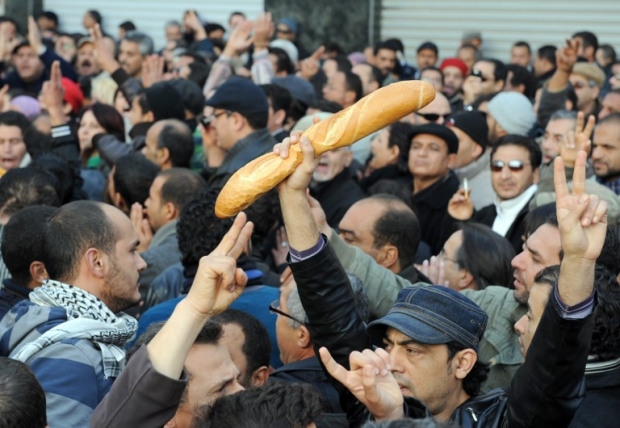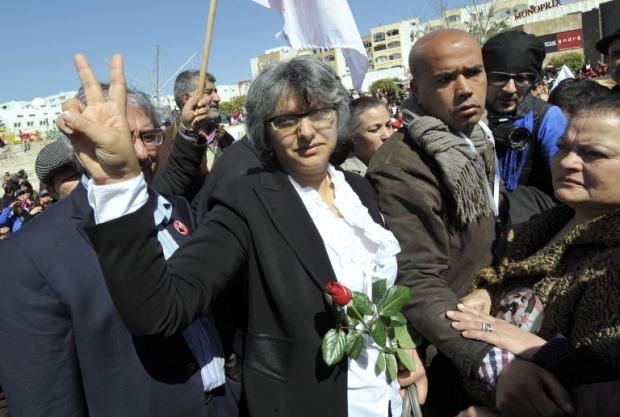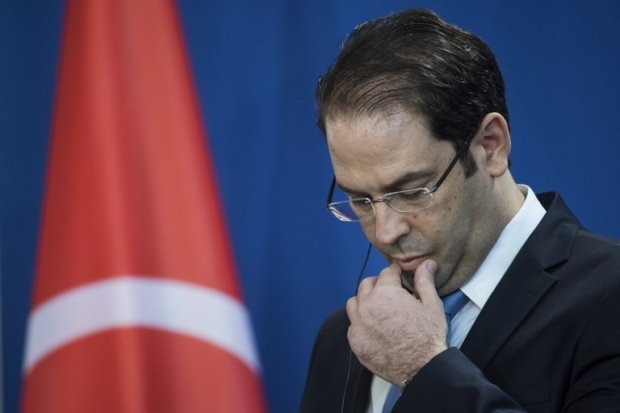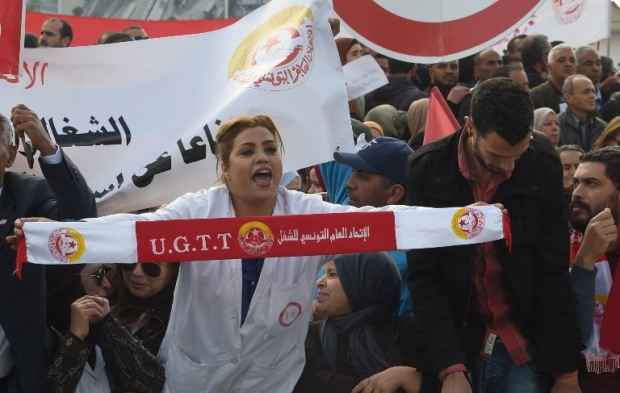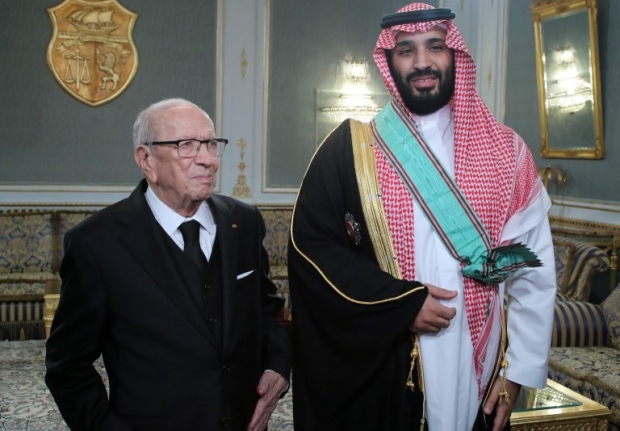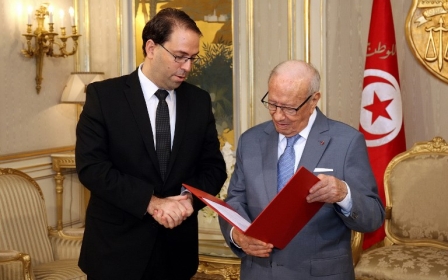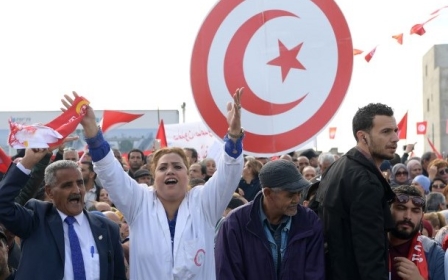From uprisings to political crisis: How Tunisia's democracy came to be at risk
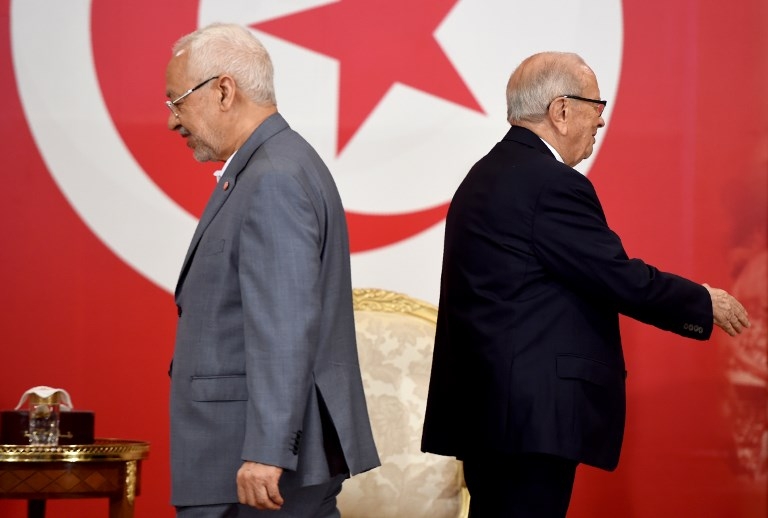
In 2014, three years after the uprisings that sparked a regional phenomenon, a political consensus in Tunisia forged the way for a successful pluralistic democracy.
But the coalition government at the centre of that consensus - originally led by Nida Tounes (nationalist) and Ennahda (moderate Islamist) - is now in jeopardy.
Nida Tounes, which won the majority of parliamentary seats and the presidency in 2014, faces an existential crisis. Many observers question whether the party could withstand the massive walkouts that have cost it its parliamentary majority and created a rival bloc formed mainly by ex-Nida members. The new bloc, the National Alliance, is set to launch a political party in January 2019.
Ennahda, on the other hand, is now the largest party in parliament and its internal unity remains largely intact – but it is now under attack by President Beji Caid Essebsi and his allies over its alleged links to two high-profile political assassinations in 2013.
In the absence of a powerful military, warring sides are resorting to the judiciary and media in a battle for control over the Arab Spring’s only successful democracy. This is how it unfolded:
First post-2011 government
Tunisia was the birthplace of the Arab Spring uprisings that led to the ousting of Tunisia’s dictator Ben Ali and then Egyptian president Hosni Mubarak in 2011, and set off protests across the region.
In the Troika government, Ennahda had 13 portfolios, constituting the majority of cabinet seats, including the key ministries of interior, justice and foreign affairs.
Two assassinations
The Troika government was challenged after the political crisis triggered by the assassination of leftist lawyer Chokri Belaid, a prominent human rights defender, on 6 February 2013. The government was criticised for its failure to confront radical extremists.
Belaid was a critic of both the Ben Ali regime and the Ennahda movement. A day before his murder, he accused Ennahda of giving a “green light” to political violence after a meeting of his supporters was attacked by hardline Salafists. His wife, Besma Khalfaoui, blamed the murder on Ennahda.
But Prime Minister Hamadi Jebali, then head of the Troika government and a member of Ennahda, condemned Belaid’s assassination as a “heinous crime against the Tunisian people, against the principles of the revolution and the values of tolerance and acceptance of the other”. In a bid to contain polarisation, he announced that a new cabinet would be formed of technocrats rather than politicians. But after failing to convince Ennahda’s leadership of his proposal, Jebali resigned on 19 February.
Another Ennahda prime minister, Ali Larayedh, assumed office the following month and reduced Ennahda’s representation to 28 percent of the cabinet, down from 39 percent. The movement ceded control of the interior and justice ministries to technocrats.
The polarisation during this period was contained largely thanks to the mediation efforts sponsored by the Tunisian National Dialogue Quartet which drafted a roadmap for the transition to a pluralistic government approved by most parties.
The group, formed in September 2013, included the powerful General Labour Union (UGTT), the Tunisian Confederation of Industry, Trade and Handicrafts, the Tunisian Order of Lawyers and the Tunisian Human Rights League. The quartet was awarded the Nobel Peace Prize in 2015.
The tensions only fully subsided with the resignation of Larayedh, who remained in office until the 2014 parliamentary and presidential elections that followed the adoption of a new constitution.
Constitution adopted
The constitution, adopted in January 2014, enshrined universal human rights and a mixed system of government, whereby the president’s powers were significantly reduced. The president would be elected by a popular vote, for a five-year term, and the prime minister would be chosen by the party with a parliamentary majority.
In October 2014, parliamentary elections led to a victory for Nida Tounes, with 37.6 percent, gaining 86 seats. Ennahda lost its majority and came second, followed by the Free Patriotic Union party (UPL) led by Slim Riahi.
In November, the founder of Nida Tounes, Beji Caid Essebsi, a former parliament speaker and foreign minister under the ousted Ben Ali, was elected president.
He named Nida Tounes member Youssef Chahed as prime minister in August 2016 after parliament withdrew confidence from then-PM Habib Essid’s cabinet. Chahed has been head of government since then.
Economic crisis
Chahed’s appointment was partly the result of a consensus between Ennahda and Nida Tounes. The two parties were among participants in the Carthage Agreement of July 2016, coordinated by Essebsi and Ennahda president Rached Ghannouchi, which was the culmination of two months of dialogue between diverse political and civil society groups over how Tunisia would meet the demands of international lenders.
A bloated public wage bill, chronic fiscal deficit and a heavily indebted economy were all factors that prompted Tunisia to seek a bailout from the International Monetary Fund (IMF) in May 2016.
Chahed’s implementation of the IMF deal over the past two years has required a set of tough austerity measures and structural reforms such as cutting fuel subsidies, reducing the public sector wage bill, and increasing taxes. The reforms have been mainly opposed by the UGTT whose 670,000 members constitute nearly 5 percent of Tunisia’s population and were hard hit by the reforms.
The union called for partial strikes on 24 October and 22 November this year to protest the Chahed government’s failure to raise the salaries of hundreds of thousands of public sector employees.
The UGTT, however, called off its October strike after months-long negotiations with the government led to an agreement to raise salaries of 150,000 employees. But under pressure from the IMF to cut the public sector wage bill from 15.5 percent to 12.5 percent of GDP in 2020, the government has “reneged on its promises” according to UGTT’s head of research Nizar Ben Saleh who spoke to MEE on the day of the November strike.
A general strike is planned for 17 January 2019, days after the eighth anniversary of the 2011 revolution. It will be the second general strike, including the public sector and all economic institutions, since the February 2013 one which followed the assassination of Belaid.
Nida Tounes splits and rival party rises
In May 2017, under pressure from international lenders, Chahed spearheaded an aggressive anti-corruption campaign that saw many businessmen, civil servants and politicians investigated. The campaign targeted individuals affiliated to both Ennahda and Nidaa Tounes, as well as independents.
Among those targeted was businessman, president of UPL and former presidential candidate Slim Riahi, who was charged with money laundering. The campaign was criticised as being “selective”, while Human Rights Watch said it was marred by violations of human rights and illegal referral of civilians to military courts.
Meanwhile, Chahed reportedly started preparing for his possible candidacy in the 2019 presidential elections, in a direct challenge of Essebsi.
Chahed’s crackdown had seemingly united Ennahda and Nida Tounes against him, leading to an agreement between the two largest parties to remove him in the summer of 2017. But Ennahda was split on Chahed.
President Essebsi called for resuming the Carthage talks in the wake of the 6 May municipal elections in which his party suffered a resounding loss of two-thirds of its support compared to the 2014 elections. Ennahda, in turn, lost half.
During the talks, Essebsi’s son and party leader Hafedh Caid Essebsi called for Chahed’s removal, accusing him of failing to deliver economic reforms. He also wrote a Facebook post formally asking Chahed to step down.
Chahed rejected the comments from Essebsi’s son and, in turn, accused him of destroying his party. On 29 May, Essebsi announced an end to the Carthage II discussions after the parties failed to agree on Chahed’s fate.
On 15 September, Nida Tounes suspended Chahed’s party membership, but Ennahda continued to back him out of fear of an economic collapse, not least because Chahed is Tunisia’s seventh prime minister in only seven years. Ennahda’s support was crucial: Chahed could not be removed without the approval of the movement’s MPs who constitute the largest bloc in parliament.
After Chahed’s suspension, many Nida Tounes MPs left their parliamentary bloc and joined a new bloc led by Chahed, called the National Alliance. The walkouts have cost Nida Tounes its parliamentary majority in favour of Ennahda. The National Alliance is now the third largest bloc in parliament, and will reportedly form a political party early next year.
On 22 November, the new secretary-general of Nida Tounes, Slim Rihahi - who was one of the targets of Chahed’s corruption probe the previous year - brought a lawsuit against Chahed before a military court, accusing him of “planning and executing a coup” and the party endorsed the case.
Essebsi-Ennahda fallout
Faced with a weakened party and an empowered former ally, Essebsi announced an end to his consensus with Ennahda movement on 24 September, citing their backing of Chahed.
Ennahda, in turn, said in a statement that it was still committed to “the path of consensus” as the foundation of Tunisia’s stability. It emphasised the importance of holding elections, scheduled for 2019, and described the party’s relationship with Essebsi as “solid” despite several disagreements.
But recent developments in the court cases launched by the defence teams of the assassinated leftist leaders Belaid and Brahmi have revived the political polarisation of 2013 and created a toxic media campaign against Ennahda, the largest party in parliament.
Although Ennahda had previously been blamed for its lax attitude towards political violence, on 2 October the defence team formally accused Ennahda of having a “secret apparatus” used for political assassinations.
Essebsi met with members of the defence team on 26 November, received their reports on the claims against Ennahda, including an alleged plan to assassinate Essebsi and French President Hollande in 2013. The claims were announced by lawyer Rida al-Radawy, and a video of the statements was posted on the official Facebook page of the Tunisian presidency.
In response, Ennahda warned against “the dangers of involving the presidency with the intention to undermine judicial independence”. In a statement, the movement said the presidency’s Facebook post was “a dangerous precedent that contradicts the neutrality of an official institution”.
A few days later, on 1 December, the defence team announced its intention to file a lawsuit against Ennahda, accusing it of “links to terrorism”, and released a list of 26 Ennahda leaders, including Ghannouchi, whom it claims are behind a “secret apparatus of the Tunisian Muslim Brotherhood”.
Ennahda was inspired by the Muslim Brotherhood school of thought when it was formed. Today, members describe themselves as Muslim democrats, rather than Islamists or as an arm of the Muslim Brotherhood.
Lawyer Ali Kalthoum, a member of the Belaid and Brahmi defence team, also said they would “soon” start a legal complaint against Ennahda movement to demand its dissolution, based on the Tunisian counterterrorism law that allows for dissolving any party or organisation over links to terrorism.
If the party or organisation is convicted of supporting terrorism, they will be banned from politics for a maximum of five years, he said.
“We have considered this lawsuit for a while, and we have the documents and evidence to prove Ennahda’s complicity in political assassinations,” he added.
Essebsi received the widow of Belaid, Basma al-Khalfawy, and lawyer Kalthoum at the Carthage presidential palace on 4 December.
Controversial visits
The Nida-Ennahda escalation happened against the backdrop of a cabinet reshuffle proposed by Chahed and approved by the Tunisian parliament on 12 November, but rejected by Essebsi who said he was not consulted prior to it.
Meanwhile, Egyptian billionaire Naguib Sawiris visited Essebsi on 19 November at the Carthage palace “to develop partnerships with a number of Tunisian institutions”. The visit triggered the anger of activists who referred to him as “the Godfather of the Egyptian coup”.
Previously, Sawiris had visited Tunisia in October 2014, days before presidential elections. Presidential candidate at the time, Moncef Marzouki, denounced Sawiris as a backer of “counterrevolutions”.
In statements to reporters, Essebsi described Bin Salman as his “son,” heaped praise on the royal family and reaffirmed the “special relationship” between the two countries.
Following the visit, former Tunisian president Marzouki accused Essebsi of joining the Emirati-Saudi camp by “demanding corrupt political money,” despite the Gulf countries’ role in “jeopardising the democratic process” in Tunisia.
He said the president is making “grave mistakes” by levelling “absurd accusations” against Ennahda and by “waging an open war” against Chahed.
New MEE newsletter: Jerusalem Dispatch
Sign up to get the latest insights and analysis on Israel-Palestine, alongside Turkey Unpacked and other MEE newsletters
Middle East Eye delivers independent and unrivalled coverage and analysis of the Middle East, North Africa and beyond. To learn more about republishing this content and the associated fees, please fill out this form. More about MEE can be found here.


